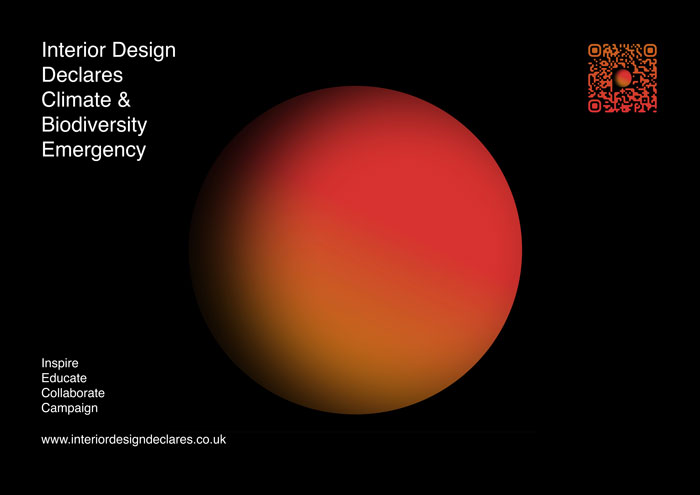Interior Design Declares: FR petition
INTERIOR DESIGN DECLARES SUPPORTS THE SCIENCE PRESENTED BY SENIOR UK SCIENTISTS
A new consensus on reconciling fire safety with environmental & health impacts of chemical flame retardants
“We, as Interior Designers, need to be responsible for the safety and sustainability of the furnishings that we specify. A new UK Scientific Consensus paper says that many of the flame retardant chemicals used by the UK sofa industry are not safe, they are toxic. Toxic to human health and toxic to the environment. We ask the UK Government to follow the lead of the United States and achieve fire safety without the use of toxic chemicals.” Delyth Fetherston-Dilke

In brief summary, the Statement calls on the UK government to:
1. Minimise the need for chemical flame retardants by incentivising industry to develop benign-by-design furniture, building materials, and other goods. These should be made from materials that are inherently less flammable than conventional fabrics and foams.
2. Adopt a systemic approach to fire safety standards, evaluating the contribution of flame retardants to fire safety in the context of behaviours that initiate fires, factors that affect fire propagation, smoke genera on, and toxicity during fires, and vulnerabilities that make people more likely to be harmed in a fire.
3. Improve the governance of standards, regulation, and testing of flame retardants and fire safety, ensuring that decision-making includes all stakeholders, and the integrity of deliberative processes is not compromised by conflicted interests.
4. Promote a culture of and funding for human environmental health research in the UK, to support the development, synthesis, and interpretation of the multi-disciplinary evidence base that is required for making evidence-informed decisions in complex regulatory environments.
5. Ensure that a very high level of certainty about the human and environmental safety of flame retardants is demonstrated before they are approved for use.
6. Develop a labelling system for tracking the use of chemicals in products, including flame retardants, that allows undesirable substances to be easily identified and diverted away from the circular economy. Interior Design Declares sit alongside Architects Declare and are part of the Built Environment Declares declaration. The group formed two years ago to demand collective action to confront the climate and biodiversity emergencies.
More on the consensus and petition:
After almost a year’s work, a scientific consensus has been signed by senior UK scientists on the need to readdress the use of toxic flame retardant chemicals.
CONSENSUS PAPER: https://www.sciencedirect.com/science/article/pii/S0160412023000557
As a result, there is a petition signed by a wider group of scientists supporting the above consensus paper. Support better fire safety measures with reduced human and environmental health risk
More on the Interior Design Declares declaration:
The twin crises of climate breakdown and biodiversity loss are the most serious issue of our time. Buildings and construction play a major part, accounting for nearly 40% of energy-related carbon dioxide (CO2) emissions whilst also having a significant impact on our natural habitats.
For everyone working in the design and construction industry, meeting the needs of our society without breaching the earth’s ecological boundaries will demand a paradigm shift in our behaviour. Together with their clients, Interior Designers Declare will need to commission and design spaces within buildings as indivisible components of a larger, constantly regenerating and self-sustaining system.
The research and technology exist for us to begin that transformation now, but what has been lacking is collective will. Recognising this, Interior Designers Declare are committing to strengthen their working practices to design spaces with a more positive impact on the world around us.
Interior Designs Declare will seek to:
● Raise awareness of the climate and biodiversity emergencies and the urgent need for action amongst our clients and supply chains.
● Advocate for faster change in our industry towards regenerative design practices and a higher Governmental funding priority to support this.
● Share knowledge and research to that end on an open-source basis.
● Evaluate all new projects against the aspiration to contribute positively to mitigating climate breakdown and encourage our clients to adopt this approach.
● Work towards including life cycle costing, whole life carbon modelling and post occupancy evaluation as part of our basic scope of work, to reduce both embodied and operational resource use.
● Work with others in the construction industry to upgrade existing buildings for extended use as a more carbon efficient alternative to demolition and new build whenever there is a viable choice.
● Act to address the disproportionate impact of these crises on disadvantaged communities and ensure that all mitigation and adaptation efforts address the needs of all people.
● Ensure diverse and inclusive principles are implemented in hiring and retaining staff so that people of all backgrounds can participate in decision-making about the future of the designed environment.
● Request 3rd party certification or similar demonstration of environmental provenance and impact for each product specified.
● Adopt more regenerative design principles in our studios, with the aim of designing spaces which go beyond the standard of net zero carbon, including the specification of ultra-low energy appliances.
● Accelerate the shift to low embodied carbon materials in all our work. Seek to reuse and recycle products and materials at every available opportunity.
● Minimise wasteful use of resources in interior design, both in quantum and in detail.
Collaborate with all members of the industry to further reduce construction and packaging waste.
Interior Designers Declare hope that everyone involved in the UK interior design industry will join them in making this commitment.
UK-based interior design practices are invited to find out more information and support ‘Interior Design Declares’ at https://www.interiordesigndeclares.co.uk/. Associated suppliers can also be signatories on condition that they have an environmental statement on their website.
#interiordesigndeclares. Information on Built Environment Declares is available here: https://builtenvironmentdeclares.com/.




